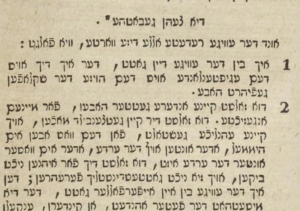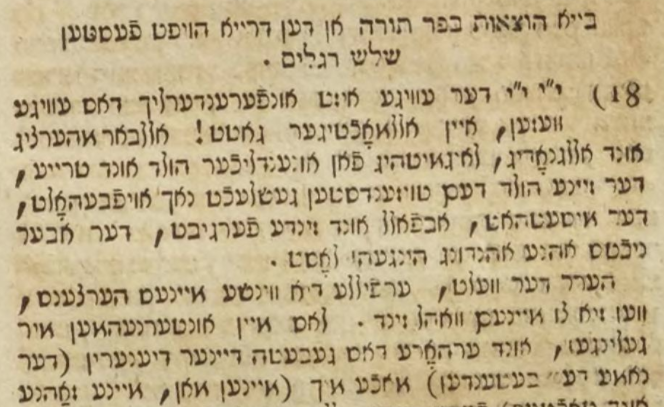| Source (German) | Translation (English) |
|---|---|
Die zehn Gebote. |
The Ten Commandments. (Exodus 20:1-14) |
Gott redete alle diese Worte und sprach: |
God spoke all these words and said: |
1. Ich bin der Ewige dein Gott, der ich dich herausgeführt habe aus dem Lande Egypten, aus dem Hause der Sclaven. |
1. I am the Eternal your God, who brought you out of the land of Egypt, out of the house of the slaves. (Exodus 20:2, Deuteronomy 5:6) |
2. Du sollst keine andere Götter haben vor meinem Angesichte. Du sollst dir kein Götzenbild machen, noch irgend eine Abbildung dessen, was im Himmel ist von oben, oder was auf der Erde ist von unten, oder was im Wasser ist, unterhalb der Erde. Du sollst dich vor ihnen nicht niederwerfen, und ihnen nicht dienen; denn ich der Ewige, dein Gott, bin ein eifriger Gott, der Missethat der Väter ahndet an Kindern, Enkeln und Urenkeln, an denen die mich hassen;[1] In den Sünden der Väter beharren; den bösen Beispielen folgen. — der aber Gnade übt bis ins tausendste Geschlecht, an denen die mich lieben und meine Gebote halten. |
2. You shall have no other gods before my face. You shall not make for yourself any graven image, nor any likeness of those things which are in heaven above, or things which are in the earth beneath, or things which are in the waters beneath the earth. You shall not prostrate yourself to them, nor serve them: for I the Eternal your God am a jealous God, visiting iniquity of the fathers upon the children, upon the grandchildren, and upon the great-grandchildren, upon them that hate me;[2] persevering in the sins of the fathers; following the evil examples. — but who exercises mercy to the thousandth generation, on those who love me and keep my commandments. (Exodus 20:3-6, Deuteronomy 5:7-10) |
3. Du sollst den Namen des Ewigen deines Gottes nicht mißbrauchen![3] Weder vergeblich noch zur Unwahrheit aussprechen. — Denn nicht ungestraft wird der Ewige den lassen, welcher seinen Namen mißbrauchet. |
3. You shall not misuse the name of the Eternal your God![4] Neither in vain, nor utter it untruthfully. — For the Eternal will not let him go unpunished who misuses his Name. (Exodus 20:7, Deuteronomy 5:11) |
4. Gedenke des Sabbath-Tages, um ihn zu heiligen! Sechs Tage kannst du arbeiten, und all dein Geschäft verrichten; der siebente Tag aber ist der Sabbath des Ewigen, deines Gottes; da sollst du keinerlei Geschäft verrichten, weder du selbst, noch dein Sohn oder deine Tochter, dein Sclave oder deine Sclavin, weder dein Vieh noch dein Fremdling, der in deinen Thoren ist. Denn sechs Tage machte der Ewige den Himmel, die Erde, das Meer und alles was in denselben ist, und ruhete am siebenten Tage; darum segnete der Ewige den Sabbathtag und heiligte ihn. |
4. Remember the Sabbath day to sanctify it. Six days you may labor, and do all your business: but the seventh day is the Sabbath of the Eternal your God: you shall do no business therein, neither yourself, nor your son, nor your daughter, nor your slave, nor your maid, nor your beasts, nor your stranger that is within your gates. For six days the Eternal made the heavens, the earth, the sea, and all that is in them, and rested the seventh day: therefore the Eternal blessed the Sabbath day, and sanctified it. (Exodus 20:8-11)[5] Cf. Deuteronomy 5:13-15. |
5. Ehre deinen Vater und deine Mutter, damit du lange lebest auf dem Erdreiche, welches der Ewige dein Gott, dir giebt. |
5. Honor your father and mother, that you may live long in the earthly kingdom which the Eternal your God gives you. (Exodus 20:12, Deuteronomy 5:16) |
6. Du sollst nicht morden! |
6. You shall not murder! (Exodus 20:13 part, Deuteronomy 5:17 part) |
7. Du sollst nicht ehebrechen! |
7. You shall not commit adultery! (Exodus 20:13 part, Deuteronomy 5:17 part) |
8. Du sollst nicht stehlen! |
8. You shall not steal! (Exodus 20:13 part, Deuteronomy 5:17 part) |
9. Du sollst nichts aussagen wider deinen Nächsten als ein falscher Zeuge. |
9. You shall not testify against your neighbor as a false witness. (Exodus 20:13 part, Deuteronomy 5:17 part) |
10. Du sollst nicht begehren das Haus deines Nächsten! Du sollst nicht begehren das Weib deines Nächsten, weder seinen Sclaven noch seine Sclavin, weder seinen Ochsen, noch seinen Esel, noch alles, was deines Nächsten ist. |
10. You shall not covet your neighbor’s house! You shall not covet your neighbor’s wife, or his slave, or his slave girl, or his ox, or his donkey, or anything that is your neighbor’s. (Exodus 20:14, Deuteronomy 5:18) |
“Die zehn Gebote” was translated/adapted by Yehoshua Heshil Miro and published in his anthology of teḥinot, בית יעקב (Beit Yaaqov) Allgemeines Gebetbuch für gebildete Frauen mosaischer Religion. It first appears in the 1829 edition, תחנות Teḥinot ein Gebetbuch für gebildete Frauenzimmer mosaischer Religion as teḥinah №64 on pp. 91-93. In the 1835 edition, it appears as teḥinah №66 on pp. 114-116. In the 1842 edition, it appears as teḥinah №69 on pp. 119-121.
We welcome corrections and improvements. The transcription of the German from Latin script in Fraktur type provided machine-readable text for a machine translation by DeepL, which we then edited for accuracy and clarity. –Aharon Varady
Source(s)


Notes

“Die zehn Gebote | The Ten Commandments (Exodus 20:1-14), in German translation by Yehoshua Heshil Miro (1829)” is shared through the Open Siddur Project with a Creative Commons Attribution-ShareAlike 4.0 International copyleft license.







![Fürbitte für die Verstorbenen [no.3] (Yehoshua Heshil Miro 1833) - cropped](https://opensiddur.org/wp-content/uploads/2022/03/Furbitte-fur-die-Verstorbenen-no.3-Yehoshua-Heshil-Miro-1833-cropped.png)


Leave a Reply